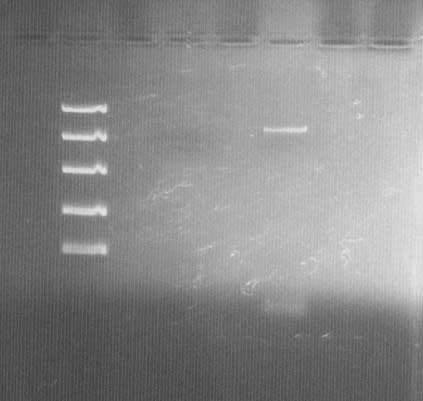Team:Stockholm/14 July 2010
From 2010.igem.org
(→Andreas) |
(→Protein expression of BBa_J18930-32 from pEX) |
||
| Line 108: | Line 108: | ||
New 3 ml LB + 1 % glucose + 100 μg/ml Amp cultures were inoculated with same clones as picked 13/7 (pEX.BBa_J18930-32 A & B). Cultures grown in 30°C ON for glycerol stock preparation. | New 3 ml LB + 1 % glucose + 100 μg/ml Amp cultures were inoculated with same clones as picked 13/7 (pEX.BBa_J18930-32 A & B). Cultures grown in 30°C ON for glycerol stock preparation. | ||
| + | |||
| + | ====IPTG stock solution==== | ||
| + | Prepared 5 ml IPTG stock solution, 0.1 M: | ||
| + | *119.15 mg IPTG | ||
| + | *5 ml dH<sub>2</sub>O | ||
| + | *Sterile filtered | ||
Revision as of 18:09, 29 July 2010
Contents |
Johan
DNA electrophoresis
Lane 1: Fermentas FastRuler™ High Range DNA Ladder ([http://www.fermentas.com/templates/files/tiny_mce/coa_pdf/coa_sm1123.pdf link]), 3: bFGF vector before site-directed mutagenesis PCR and Dpn I treatment (low concentration; 10 ng/µl), 5: bFGF vector after site-directed mutagenesis PCR and Dpn I treatment.
The vector (bFGF-pGEX) shows the correct size of ~5,5k bp. Comparison between lane 3 & 5 also shows that the amplification in the PCR worked and that Dpn I treatment did not cause problems.
Transformation
PCR creates linear DNA, to make the vector circular it has to be transformed; the E. coli makes it circular.
Notes on protocol:
Step 1. Two tubes Bl21 tubes with competent cells were used, one for the linear mutagenesis DNA vector, and one for commercial plasmid as a positive control.
Step 2. 1 µl was used for both transformations.
Step 3. LB was used instead of SOC.
Step 9. No dilutions was made
Step 10. 50 µl was plated. Two plates was used for each reaction, one commercial carbenicillin plate and one of our ampicillin plate (to examine the state of our plates).
Colony PCR
A colony PCR was performed with tubes from Andreas.
(make names more clear..)
- PC 30 A
- PC 31 A
- PC 32 A
- PC 30 B
- PC 31 B
- PC 32 B
- PA 30 A
- PA 31 A
- PA 32 A
- PA 30 B
- PA 31 B
- PA 32 B
- PK 30 A
- PK 31 A
- PK 32 A
- PK 30 B
- PK 31 B
- PK 32 B
- PA SOD A
- PA SOD B
- PC SOD A
- PC SOD B
- PK SOD A
- PK SOD B
- PC yCCS A
- PC yCCS B
- All reaction used VF & VR2 primers. The primers were diluted 15x to get a concentration of 10 µM.
- 33 µm H2O
- 2 µl f.primer 10 µM
- 2 µl r.primer 10 µM
- 1 µl dNTPs 10 mM
- 10 µl Pfu buffer 10x
- 1 µl PfuX7 polymerase
- 1 µl template DNA
- PCR Reaction:
- 98 °C - 2 min
- 31 cycles of
- 98 °C - 10 sec
- 55 °C - 15 sec
- 72 °C - 3 min
- 72 °C - 5 min
- 4 °C - ∞
Andreas
Clonings
Colony verifications
Continued from 13/7
Restreaks
White colonies for all streaked/picked constructs except:
- pSB1K3.SOD (a)
- pSB1C3.SOD (b)
- pSB1K3.BBa_J18931 (a)
- pSB1A3.BBa_J18931 (b)
- pSB1C3.yCCS (a)
Gel verifications
pEX.X constructs picked and amplified 13/7 were separated on a 1 % gel. No good results, gel results discarded. New gel to be run tomorrow.
Top10 ON cultures
One of the tubes lost its cap during ON incubation, so new ON cultures (5 ml LB + 100 μg/ml Amp) were set.
Protein expression of BBa_J18930-32 from pEX
BL21 ON cultures of pEX.BBa_J18930-32 were used to inoculate cultures for IPTG induction:
- 80 ml LB
- 1 % glucose
- 100 μg/ml Amp
- 0.8 ml ON culture
Culture grown in 37°C, 250 rpm until an OD600 of ≈0.5. However, experiment was cancelled due to lack of time.
New 3 ml LB + 1 % glucose + 100 μg/ml Amp cultures were inoculated with same clones as picked 13/7 (pEX.BBa_J18930-32 A & B). Cultures grown in 30°C ON for glycerol stock preparation.
IPTG stock solution
Prepared 5 ml IPTG stock solution, 0.1 M:
- 119.15 mg IPTG
- 5 ml dH2O
- Sterile filtered
 "
"
